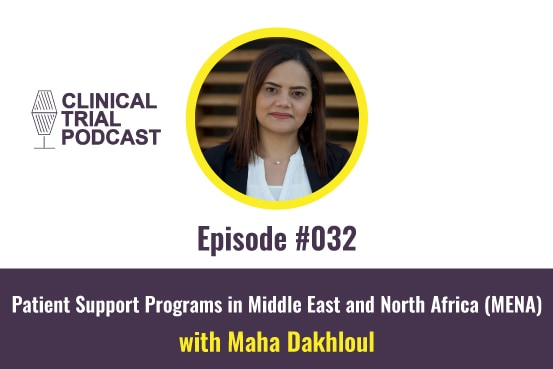In this episode, I had an opportunity to speak with Maha Dakhloul on the topic of Patient Support Programs (PSPs) in the Middle East and North Africa (MENA region).
Maha does a great job of explaining with us how PSPs are set-up, how one can develop a PSP, the lesser known components of a PSP, how to measure a successful PSP, how to evaluate a PSP provider, the interdependence of clinical trials and PSPs in the MENA region and much more.
This interview was recorded shortly after the explosion in Beirut in August 2020. I’d like to thank Maha for taking the time to chat even though her city was experiencing such pain.
Maha has a bachelor’s degree from the Arab University of Beirut. She has worked as Clinical Research Coordinator, Clinical Research Associate, Regulatory Affairs Manager, Clinical Project Manager and is currently the Clinical Operations Manager at Phoenix Clinical Research .
Please join me in welcoming Maha on the Clinical Trial Podcast.
Maha Dakhloul on LinkedIn
Sponsor
Florence Healthcare: Transform your Clinical Trials with the #1 Platform for Electronic Document Workflows and Remote Site Access.
Learn how Florence Healthcare helps over 7,200 research sites, sponsors, and CROs across 27 countries take their day back from paper.
Show Notes
- [04:07] Objectives of a patient support program (PSP) – cost, compliance, and patient education
- [06:05] Role of patient support programs in Lebanon
- [10:57] Clinical trials versus patient support programs
- [13:12] Examples of PSPs include patient training by “care coaches”, in-house monitoring and patient management, financial support such as giving patient discounts
- [16:12] Safety profiling of the medication (pharmacovigilance)
- [17:38] Data fields include patient compliance, patient complaints, doctors prescribing the data, pharmacy information, patient profiling, patient age, pre-existing conditions, and accompanying medication
- [18:58] Getting started with a patient support program – what is the disease, what is the drug, profile of patients, treatment, patient’s perception of the disease, what are the competitor’s doing, business value, patient value, competitive advantage for the company, design services for the patient
- [21:46] Tools to track patient and medication data including Key Performance Indicators (KPIs)
- [24:16] Post-marketing studies
- [26:20] Stakeholders in a patient support program generally include the pharmaceutical company or the drug manufacturer, drug depot, pharmacy, third party vendors like a CRO, sometimes banks, healthcare professionals (general practitioner, specialist, nurses, patient educators, PSP coordinators, patients, caregivers, regulatory authorities
- [29:18] Role of technology in a PSP
- [31:41] Enrolling in a PSP and how consenting is done
- [32:27] Lesser known educational and screening tools
- [33:39] KPIs for a PSP depend on phase of the project, patient compliance, stakeholder satisfaction, patient reported outcomes, and program finances
- [36:39] How much to budget for a PSP?
- [37:33] Challenges with PSP – convincing healthcare providers or patients to participate in the program, tracking patient withdrawals and adherence, understanding of the government regulations
- [40:11] Misconceptions with data collection and program implementation. Patients trust relatives more than medical doctors
- [41:58] What does “enrollment” in a PSP mean?
- [43:56] Evaluating vendors based on quality and data compliance








1 Thought on "Patient Support Programs in Middle East and North Africa (MENA) with Maha Dakhloul"